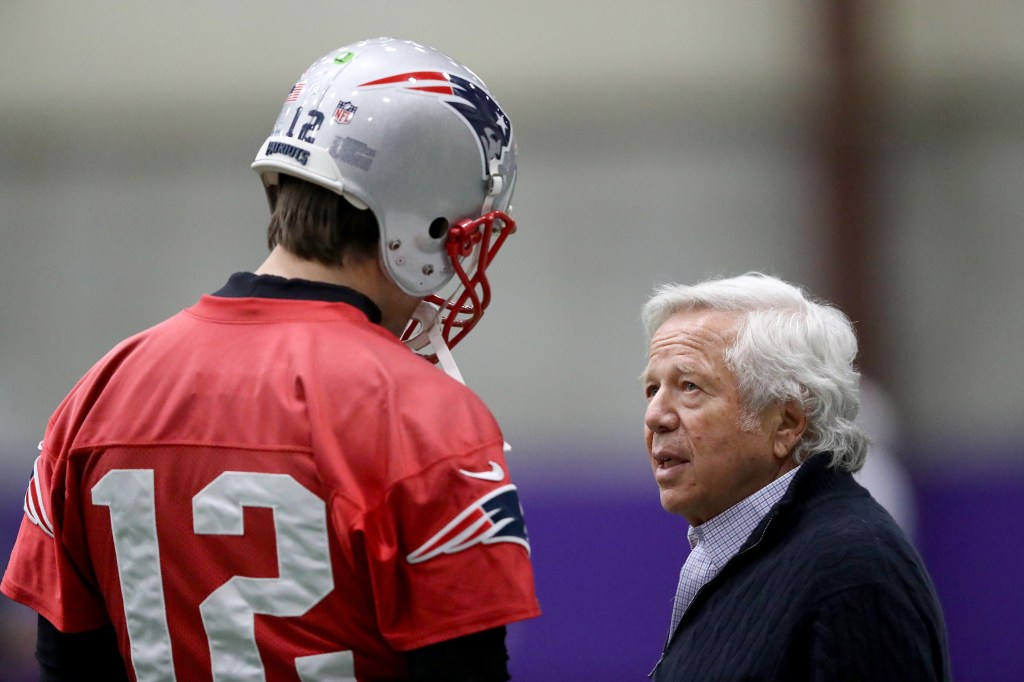
Robert Kraft, a longtime leader in the exclusive club of National Football League team owners, can look to the future and see labor peace and continued prosperity in the NFL for years to come. Sure, there’s the ongoing kerfuffle with Daniel Snyder and allegations the Washington Commanders owner has been amassing information to blackmail fellow members of the club, charges he’s denied and about which Kraft had no comment.
But elsewhere, the league is chugging along. Its collective bargaining agreement with players is cemented for another eight years, and the insanely lucrative deals with media companies to broadcast games run through 2033.
As for Kraft’s team, the New England Patriots, do we even have to mention that their record 11 Super Bowl appearances have made them the most hate-envied team everywhere but on their home turf, where they’re as beloved as white clam chowder?
For a long time, Kraft has loved the Pats, too. He began attending games as a season ticket holder with his family in 1971 — Section 217, Row 23, Seats one through six — and ended up buying the team in 1994 for $172 million, which at the time was the NFL’s highest sales price. Forbes valued the Patriots this year at $6.4 billion, second in the league, and Kraft himself at US$10.6 billion, good for No. 59 on the Forbes 400 list.
But looking back, at the age of 81, on all that he’s accomplished, it doesn’t seem to matter as much as it used to. “My passion at this point of my life,” Kraft told Forbes, “is my philanthropy.”
The latest is a US$50 million gift through his family foundation to Massachusetts General Hospital, or MGH, where his son, Jonathan Kraft, is board chair. It’s the largest donation in the institution’s 200-year history and will bankroll a healthcare network that combats systemic inequities affecting Black and Hispanic communities.
“People like myself who have been privileged to do pretty well have to make sure that inequities in any form, we have to do our best to correct them,” Kraft said in a wide-ranging interview in which he insisted he be addressed as “RKK” because that’s what his friends call him.
Kraft said part of the donation will fund research on sickle-cell anemia, a blood disease that affects one in 13 Black babies. Kraft credited Patriots players Matthew Slater, Devin McCourty and Jason McCourty for tipping him to sickle cell and the underfunding of the campaign to find a cure. In 2019, the McCourty brothers helped raise US$250,000 for research.
“I didn’t realise that it was something that mainly impacts the Black community,” Kraft said. “If it were a disease in the white community, the research money would’ve been dedicated, and we would have a solution to this.”
Longtime Patriots fans will recognize the inspiration for Kraft’s latest passion: his late wife, Myra Hiatt Kraft, who died of ovarian cancer in 2011. She was an avid philanthropist. “She went into the trenches and did the work,” Kraft said.
The Krafts had every resource available to them, and Myra’s illness and death was still filled with stress and uncertainty, Kraft said. It got him to thinking about families from humble backgrounds, who have the same daily burdens of a serious health problem, but without the same access.
“When she got sick and died,” Kraft said, “I started thinking what she would like and respecting what her life was about.”
The donation to MGH brings his total giving to the institution to an estimated US$75 million since 2010. MGH said Kraft would support a permanent position named after him that would target diversity, equity and inclusion in clinical care. The Massachusetts General Blood Donor Center will be renamed after the Kraft family, and funds will also continue to support the Kraft Center for Community Health, first named after the family in 2011.
“Most of our giving now is to build bridges and things that will bring people together,” Kraft said.
There are still significant negotiations ahead for the NFL. There’s the Snyder unpleasantness, and The Athletic reports that owners need to resolve how to pay US$790 million owed to the city of St. Louis related to Rams owner Stanley Kroenke’s relocation to Los Angeles in 2016. That issue could be resolved as soon as next week, when team owners meet in New York.
Meanwhile, Kraft has his eyes on his legacy. “I hope we lead by example,” he said. “It can influence other people who’ve had some of the same privileges and benefits to try and do things to break down the inequities that exist.”
This article was first published on forbes.com